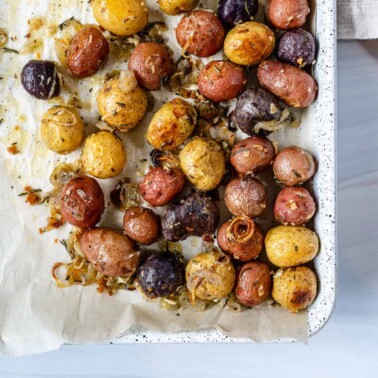As an Amazon Associate I earn from qualifying purchases.
Learn how to store fresh herbs properly to keep them vibrant and flavorful for longer – in the fridge, freezer, or by drying them!

The Best Way To Store Herbs
Herbs are a great way to elevate any meal – whether as a garnish, with pasta, for pesto like this vegan pesto, salsa (like this easy Pico de Gallo), and more. But, they have a tendency to go bad quicker than you’d like. Once upon a time, I’d just buy herbs, shove them in the fridge as-is, and hope they last until needed. Having confronted a pile of slime one too many times, though, I decided it was time to learn how to store fresh herbs to make them last longer.
With some research and experimentation, I soon learned that the two main types of herbs (soft herbs and woody/hardy herbs) require different storage methods. Storing them properly not only preserves their flavor and nutrients but also extends their shelf life. In this post, I’m sharing the best tips and tricks to keep your herbs fresh so you can enjoy them longer and avoid food waste.
How to Store Tender Herbs
First up, here are some tender herbs (with tender stems/delicate leaves) that work with the below method:
- Cilantro
- Parsley
- Mint
- Dill
- Chives
- Tarragon
- Basil (but this has special storage instructions)
So, how do you store herbs in the fridge? The key for tender herbs is to store them like a flower bouquet:
- Clean the herbs: First, remove any rubber bands/fastenings, as they can damage the herbs. Then, wash the herbs (swished in a bowl of clean, cold water) and dry them thoroughly with a salad spinner/clean dish towel. Remove as much water as possible.
- Trim the herbs: Gather the bunch and trim the bottom ½-inch from the stems.
- Add water to a jar: Add 1 to 2 inches of clean water to a jar (not so much that any ‘leaves’ are touching the water – just the stems), then submerge the stems in the water, like a bouquet of flowers.
- Cover them well: If the jar is tall enough, add the lid (without crushing the herbs). Alternatively, place a clear plastic bag like a Ziplock over the top to block out as much air as possible. Secure it with a rubber band.
For the best results, change the water every 2-3 days and optionally give the stems a small trim. With this method, you can increase the life of herbs from a few days to weeks.
How To Store Fresh Basil?
Although it’s a tender herb, basil needs a slightly different approach as it can bruise and become blacked when refrigerated.
Instead, prepare the basil ‘bouquet,’ as written above, without washing the herb, then store it on the counter away from direct sunlight.
How to Store Hardy Herbs
Here are a few of the hardy/ woody herbs (with a tougher, woody stem) you can use for the method below.
- Rosemary
- Thyme
- Sage
- Oregano
- Marjoram
- Chives (though tender, this method works best for them)
Note, if they’re very fresh, hardy herbs can also be stored bouquet style. However, the best way to store them is as a damp paper towel bundle:
- Wash and dry the herbs: I prefer to swish vs. rinsing. Then, dry them thoroughly with a salad spinner or a clean kitchen towel.
- Trim them: Remove about an inch of the stem.
- Dampen paper towels: They need to be lightly damp but not dripping wet. Either use a spray bottle or, if it’s a tough paper towel, saturate it, then squeeze out any excess liquid. I recommend using a couple of pieces per herb bundle.
- Wrap the herbs: Place the herbs in a single layer on the damp paper towel and wrap or roll them in the paper towels.
- Transfer to an airtight container: Either place the wrapped bundles in a Ziplockor other airtight container to prevent oxygen, which causes premature leaf wilting.
- Store in the fridge: For optimal freshness, store them in the crisper drawer.
For the best results, re-dampen or change the paper towels every 2-3 days or sooner if they begin drying out.

How Long Will They Last?
While this depends on how fresh the herbs were when you bought them, proper storage will see both soft and hardy herbs lasting 2-3 weeks, though sometimes longer.
Generally, I’ve found that chives last a little less (7-10 days), mint and basil last around 2 weeks, and the rest last 2-3 weeks.
How Do I Know if Herbs Have Gone Bad?
You’ll know herbs have gone bad when they darken or wilt/become slimy, the stem shows signs of mold, and/or they no longer smell fresh and herby.
FAQs
Several factors can cause quick herb spoilage, including:
Too much exposure to oxygen (especially with basil and mint, which brown/blacken) or light (which causes delicate herbs to yellow), or an incorrect balance of moisture. Also, it’s important they don’t get too hot or too cold, which can speed up spoilage.
Herbs can carry germs/debris that could speed up decay unless washed away. However, it’s very important to ensure they’re thoroughly dry afterwards.
Yes, you can store fresh herbs together, as long as they have space to breathe.
Try shocking them in an ice bath for 15-60 minutes until bright and perkier. Then drain thoroughly and use.
As long as they haven’t browned, turned slimy, or rotted, you can still use herbs in all kinds of recipes where looks don’t matter (like soups and stews), use them to make pesto, herby vegan butter, infuse olive oil with them, etc.

How To Freeze Fresh Herbs
Hardy herbs: Either prepare the damp paper towel bundles and freeze them in a Ziplock or create ‘portions’ in plastic wrap and store in a freezer bag, squeezing out excess air.
Soft herbs: Chop or blend (the latter works well for large quantities) the herbs and portion them into an ice cube tray topped up with water or oil. Once frozen, transfer the herb cubes to a Ziplock. You can throw them directly into a pan/soups/sauces from frozen.
Basil leaves freeze best after first blanching them, then drying and freezing them in a single layer on a cookie sheet before transferring the frozen leaves to a freezer-safe bag.
Frozen herbs can be stored for 3-6 months (those stored in oil tend to last longer).
Drying Fresh herbs for Long-Term Storage
Want to preserve fresh herbs for even longer? Try drying them!
Air-Drying Herbs:
Tie a few stems (just 3-5) together with kitchen twine and hang them upside down in a dry, warm, well-ventilated area away from direct sunlight. This method can take several days or even up to 2 weeks, depending on the herb and climate.
Dehydrator or Oven Dry:
Spread the herbs in a single layer across a parchment-lined baking tray/ dehydrator tray and heat at 95-115F/35-46C. Dry the herbs for between 2-5 hours, checking every 30-45 minutes until they’re brittle. The herb type, temperature, and humidity can all affect the time.
If your oven doesn’t go that low, set it to its lowest setting (170F/75C is mine) and prop the door slightly open while they dry.
It’s also possible to dry herbs in a microwave, placed between two paper towels, and heated in 30-second increments on medium to high power until brittle.
How To Store Dried Herbs?
Once ready, store dried herbs in a mason jar for up to a year – out of direct sunlight.













